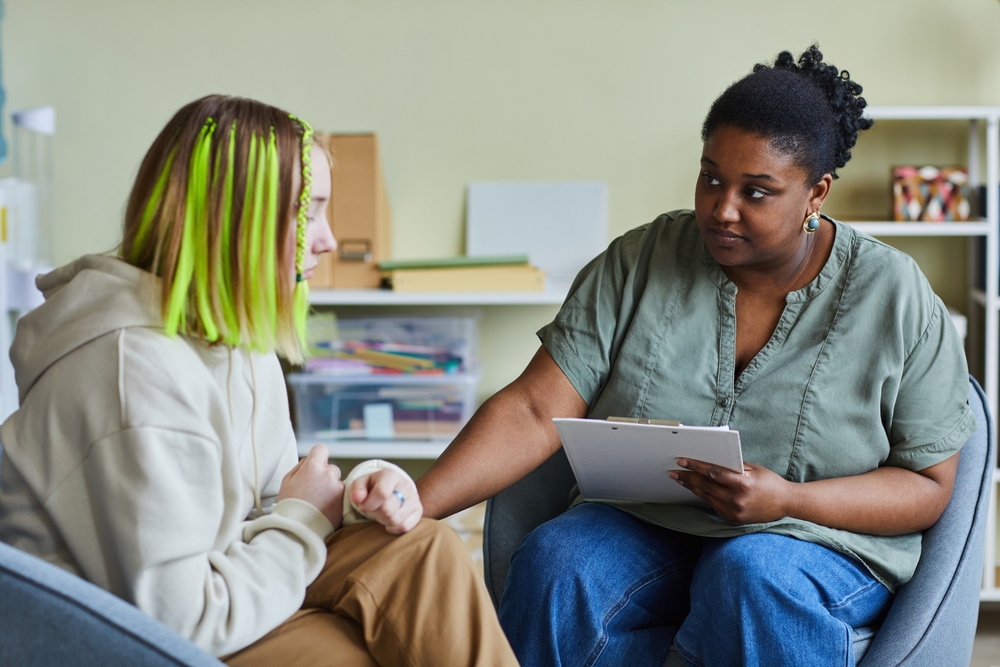The World Health Organization (WHO) explains mental health as “a state of well-being in which the individual realizes his or her own abilities, can cope with the normal stresses of life, can work productively and fruitfully, and is able to make a contribution to his or her community.” Mental health can be influenced by a variety of factors. Self-care, for example, which is defined as “the ability to care for oneself through awareness, self-control, and self-reliance in order to achieve, maintain, or promote optimal health and well-being,” plays a crucial role in teenage mental health. Self-care encompasses activities, practices, and habits intended to reduce mental and physical stress and strain while simultaneously fostering feelings of inner peace and happiness. Teaching young people about the importance of self-care is vital in teen mental health because it:
- Builds emotional resilience: Self-care practices such as mindfulness exercises (e.g., meditation, deep breathing, visualization, etc.), as explained by Courtney Clark, in her famous TED Talk, have been positively connected to emotional resilience. Data shows that meditation can help lower blood pressure, reduce feelings of anxiety and depression, improve insomnia, and more.
- Promotes self-esteem: According to research, engaging in self-care practices that involve creative activities can positively affect adolescents’ behavioral changes, self-confidence, and self-esteem.
- Encourages physical wellness: According to a 2015 meta-analysis, engaging in self-care through physical activity is associated with increased self-concept and self-worth in children and adolescents. According to a 2018 study, self-concept plays an important role in emotional health. Meaning, when teenagers feel good about themselves, they can better cope with stressful life events and maintain positive mental health.
- Stimulates cognitive development: A major study found that physical activity spurs the release of proteins that cause nerve cells to grow and make new connections, which improves brain function and subsequently enhances mental health.
Adolescence can be a challenging and tumultuous time, filled with academic pressures, social changes, and hormonal fluctuations. Learning the importance of and how to effectively implement consistent self-care practices can benefit a young person throughout their adolescence and long after. Engaging in a self-care routine has been clinically proven to reduce or eliminate anxiety and depression, diminish stress, boost happiness, as well as increase one’s capacity to adapt to change and recover from setbacks more easily. Self-care practices are essential for teenagers as they help teens ground themselves in healthy habits that emphasize mental, emotional, and physical well-being, which ultimately nurture positive adolescent mental health.
For Information and Support
Every family in need of mental health treatment must select a program that will best suit the needs of their family. When one member of a family struggles, it impacts everyone in the family unit. To maximize the benefits of treatment we work closely with the entire family to ensure that everyone is receiving the support they need through these difficult times.
Seeking help is never easy, but you are not alone! If you or someone you know needs mental health treatment, we strongly encourage you to reach out for help as quickly as possible. It is not uncommon for many mental health difficulties to impact a person’s life, long term. Pursuing support at the beginning of one’s journey can put the individual in the best position to learn how to manage themselves in a healthy way so they can go on to live happy and fulfilling lives.
OUR KNOWLEDGEABLE ADMISSIONS TEAM CAN BE REACHED 24/7 AT INFO@PACIFICRTC.COM OR CALL: 800-531-5769
We are available to answer any questions you may have regarding mental health treatment and our residential program, anytime. Contact us today using the form to the right.






